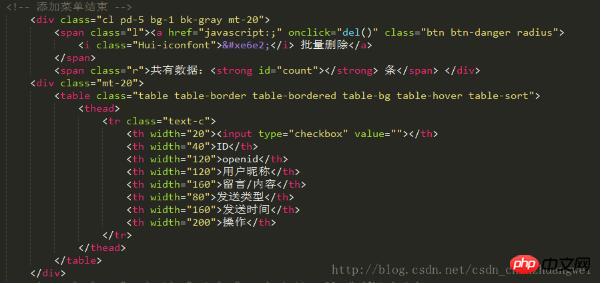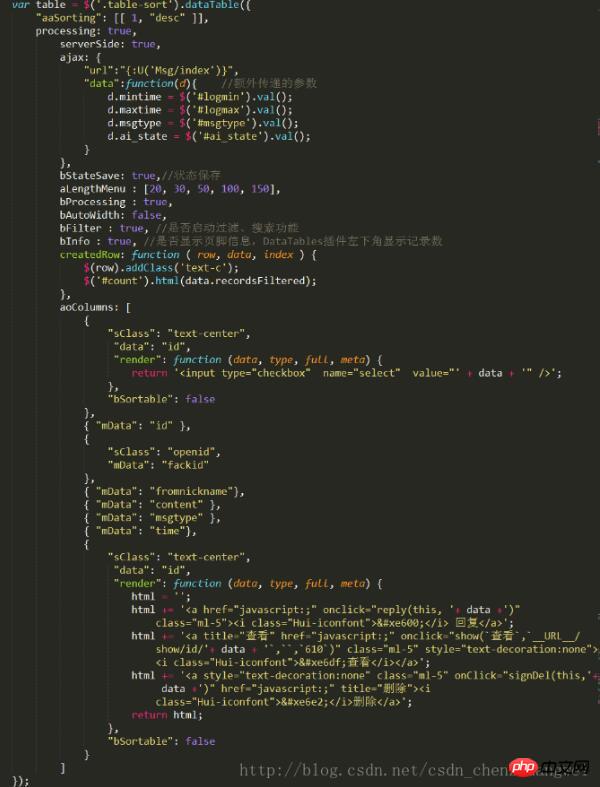Home >Backend Development >PHP Tutorial >ThinkPHP integrates datatables to implement server-side paging (with code)
ThinkPHP integrates datatables to implement server-side paging (with code)
- php中世界最好的语言Original
- 2018-05-19 09:53:581951browse
This time I will bring you ThinkPHP to integrate datatables to implement server-side paging (with code). What are the precautions for ThinkPHP to integrate datatables to implement server-side paging. The following is a practical case, let's take a look.
There is a need to make something recently, because the amount of data is huge. Here I decided to use the server-side paging of datatables, and also need to pass the query conditions to the server. Most of the articles searched on the Internet felt that there were some errors, so I encapsulated them myself. The main configuration/tools are: Server: php (using thinkphp)The page style comes from H- ui framework (datatables version is 1.10.0)The main modified (databases) configuration items are:
1) bProcessing:true using ajax Source2) serverSide:true Use server-side paging3) createdRow:function(){}Callback function, used to add event or class name
4) aoColumns is used to process and display data, in which the render attribute is used to customize columns1. The js code of datatables is:
$('.table-sort').dataTable({
processing: true,
serverSide: true,
ajax: {
"url":"{:U('Msg/index')}",
"data":function(d){ //额外传递的参数
d.mintime = $('#logmin').val();
d.maxtime = $('#logmax').val();
}
},
bStateSave: true,//状态保存
aLengthMenu : [20, 30, 50, 100, 150],
bProcessing : true,
bAutoWidth: false,
bFilter : true, //是否启动过滤、搜索功能
bInfo : true, //是否显示页脚信息,DataTables插件左下角显示记录数
createdRow: function ( row, data, index ) {
$(row).addClass('text-c');
$('#count').html(data.recordsFiltered);
},
aoColumns: [
{
"sClass": "text-center",
"data": "id",
"render": function (data, type, full, meta) {
return '<input type="checkbox" name="select" value="' + data + '" />';
},
"bSortable": false
},
{ "mData": "id" },
{ "mData": "fromnickname"},
{ "mData": "content" },
{ "mData": "msgtype" },
{ "mData": "time"},
{
"sClass": "text-center",
"data": "id",
"render": function (data, type, full, meta) {
html = '<a title="查看" href="javascript:;" rel="external nofollow" rel="external nofollow" onclick="show(`查看`,`URL/show/id/'+ data + '`,``,`610`)" class="ml-5" style="text-decoration:none"><i class="Hui-iconfont">查看</i></a>';
html += '<a style="text-decoration:none" class="ml-5" onClick="signDel(this,'+ data +')" href="javascript:;" rel="external nofollow" rel="external nofollow" title="删除"><i class="Hui-iconfont"></i>删除</a>';
return html;
},
"bSortable": false
}
]
});
2. Server side:
控制器: 接收参数如下: draw 前端传过来的值,原值返回,用于验证 mintime、maxtime 自定义参数(时间) search.value datatables搜索框参数,用于查询筛选 order.0.column 要排序的单元格(从0开始,字段需要自己设置) order.0.dir 排序(升序、降序) start 起始条数(第几条开始) length 查询长度 返回的数据如下: draw 返回前端传过来的值 recordsTotal 记录总条数 recordsFiltered 条件筛选后的记录总条数 data 服务端查询的数据 返回数据形式:json
3. The complete code of the server backend is as follows:
1) Controller code:public function index()
{
if(IS_AJAX){
$list = D('Msg')->getData(I('get.'));
$this->ajaxReturn($list);
}
$this->display();
}2) Model layer code: (*among them, the dealTime method is mainly used to process the time period)
public function getData($data)
{
//获取Datatables发送的参数 必要
$draw = $data['draw']; //这个值直接返回给前台
//获取时间区间
$timeArr['mintime'] = $data['mintime'];
$timeArr['maxtime'] = $data['maxtime'];
$where = $this->dealTime($timeArr);
//搜索框
$search = trim($data['search']['value']); //获取前台传过来的过滤条件
if(strlen($search) > 0) {
$where['id|fromnickname|content|msgtype'] = array('like','%'.$search.'%');
}
//定义查询数据总记录数sql
$recordsTotal = $this->count();
//定义过滤条件查询过滤后的记录数sql
$recordsFiltered = $this->where($where)->count();
//排序条件
$orderArr = [1=>'id', 2=>'fromnickname', 3=>'content', 4=>'msgtype', 5=>'time'];
//获取要排序的字段
$orderField = (empty($orderArr[$data['order']['0']['column']])) ? 'id' : $orderArr[$data['order']['0']['column']];
//需要空格,防止字符串连接在一块
$order = $orderField.' '.$data['order']['0']['dir'];
//按条件过滤找出记录
$result = [];
//备注:$data['start']起始条数 $data['length']查询长度
$result = $this->field('id,fromnickname,content,msgtype,time')
->where($where)
->order($order)
->limit(intval($data['start']), intval($data['length']))
->select();
//处理数据
if(!empty($result)) {
foreach ($result as $key => $value) {
$result[$key]['time'] = date("Y-m-d H:i:s",$value['time']);
$result[$key]['recordsFiltered'] = $recordsFiltered;
}
}
//拼接要返回的数据
$list = array(
"draw" => intval($draw),
"recordsTotal" => intval($recordsTotal),
"recordsFiltered"=>intval($recordsFiltered),
"data" => $result,
);
return $list;
}3) Implement self- Define ajax search
1. 在WdatePicker中添加onpicked回调函数 2. 执行table.fnFilter(),其中table为datatables对象Take the WdatePicker plug-in as an example (the input box is similar, just bind the onchange event):
<input type="text" onfocus="WdatePicker({maxDate:'#F{ $dp.$D(\'logmax\')||\'%y-%M-%d\'}', onpicked:function(){table.fnFilter();}})" name="mintime" id="logmin" class="input-text Wdate" style="width:120px;">3. The data attribute in the ajax attribute in datatables defines additional parameters to be passed Example:
ajax: {
"url":"{:U('Msg/index')}",
"data":function(d){ //额外传递的参数
d.mintime = $('#logmin').val();
d.maxtime = $('#logmax').val();
}4) Code screenshot:
a. html page

b.js part

What are the ways to implement multi-dimensional array sorting algorithm in PHP
PHP’s RSA encryption, decryption and development interface Case usage analysis
The above is the detailed content of ThinkPHP integrates datatables to implement server-side paging (with code). For more information, please follow other related articles on the PHP Chinese website!

